Is ChatGPT the end of high-school English and maybe…Google?
DALL·E, a generative AI developed by OpenAI. The bot created an image from the input: “ai doing homework for you.”
Move over, Google. There’s a new tech king in town: ChatGPT.
From cheating to taking over the world, this bot has endless possibilities. But don’t be fooled by its impressive capabilities. ChatGPT is not a panacea for all your problems. It’s like having a genie in a bottle: you might get what you wish for, but it might not be exactly what you expected.
[This lead was written by ChatGPT]
Wait, how does it work?
ChatGPT is a type of Artificial Intelligence that can understand and generate language. The bot has gobbled up trillions of words from the internet, books and conversations, and uses all that knowledge to chat with users. Just like a human friend, the bot remembers your dialogue and fine-tunes its following responses to best fit your commands. It essentially functions like how your phone gives you suggested words when texting—but on steroids.
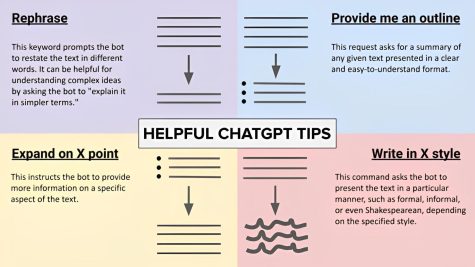
Okay, so what?
Generative AI has many applications. You can ask it anything. It can serve up verbose information in clear, simple summaries. It can explain complicated concepts in bite-size styles. It can generate unique works of poetry, essays, and code from scratch. From teaching trigonometric identities to writing Taylor Swift-inspired songs, ChatGPT can do it all.
When I first played around with it, I asked ChatGPT to write a Shakespeare poem. It did. Then I asked it to analyze the poem line-by-line. It did. Mystified, I asked it to write an essay using that analysis.
It did.
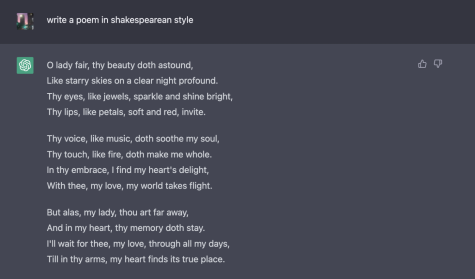
ChatGPT analysts suggest that the technology has endless possibilities, such as revolutionizing coding, replacing jobs and taking over the world, but today I’ll focus on its academic impact.
Can I use it for schoolwork?
Yes.
ChatGPT is to writing what a calculator is to math.
For all those painstaking research assignments, instead of spending hours reading what feels like hundreds of articles, trying to filter out the extraneous details, ChatGPT can summarize them all, generating a beautiful outline with only the important information.
The way the AI can display text in a user-friendly manner makes understanding what you’re reading easier. For example, I’ve asked the bot to “explain (insert concept here) like I’m 5 years old” countless times, and it has worked like a charm.
With its ability to reproduce, summarize and expand information, ChatGPT is like a better version of Google. While the classic search engine spawns thousands of articles while simultaneously throwing ads in my face, ChatGPT gives me a clear, concise answer in an instant. Most notably, one of its most useful functions is its follow-up feature, allowing users to ask follow-up questions immediately after a search query to clarify aspects of the initial search. It’s like having a personal teacher at your fingertips at all times.
The difference between Google and ChatGPT becomes especially unmistakable when the user is working under time constraints. As a student who’s buried under heaps of schoolwork nearly every week, efficiency is key.
And every second saved using ChatGPT is one more precious second for extra sleep.
That’s cool and all but how about using it to cheat?
Now to address the elephant in the room: yes, ChatGPT has crazy potential for cheating. Do you have an English essay due at 11:59, and it’s 11:55? Just enter the prompt, and within seconds, the bot will pump out a unique, well-thought-out piece.
Wait, that sounds a little too good to be true…
ChatGPT isn’t the godsend for homework that you may think it is.
If you plan to use the bot for essays, you need to have a strong understanding of the contents of the essay it generates to know whether the text is sensible or complete nonsense. Why?
Because ChatGPT is very good at creating crap.
Since the bot is trained by its developers to predict the most likely words that follow based on the input, ChatGPT is appalling at interpreting human speech and slang and cannot comprehend basic logic, which can lead to it producing nonsensical responses.
For example, I asked the bot a simple math question, which it hilariously failed.
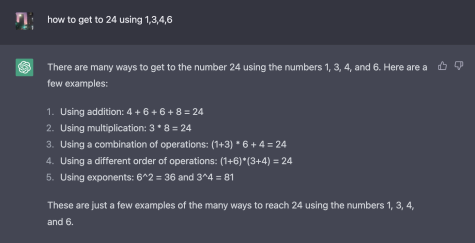
Some critics of ChatGPT argue that the AI technology will make writing and English classes irrelevant. This false narrative is baseless, as people are vesting their complete trust in the bot to write for them, but the truth is: ChatGPT is the embodiment of the idea that “if you say something with confidence, people will believe it,” regardless of its credulity.
For writing essays, specifically, the AI’s ability is really limited in scope and isn’t compatible with the kind of writing we do in English class. It lacks style, tone, mood, figurative language and the capacity to make logical connections—all of which are essential English tools.
In the end, it’s just a bot that recycles information and lacks the human touch required for an A-grade essay.
As ChatGPT would put it: “ChatGPT may be able to produce text that is grammatically correct and coherent, but it lacks the critical thinking and understanding required to write a well-written and well-researched essay.”
So what’s the takeaway from all of this?
Although the chatbot can help with your school work, it can’t complete your work.
ChatGPT may just be the ultimate tool for procrastinators and lazy students everywhere. With its ability to summarize and generate essays at lightning speed, it’s like having a personal homework-doing robot at your fingertips. But just like any robot, it’s not perfect and can sometimes produce some truly ridiculous answers. So, before turning in that essay or presentation, make sure to give it the ol’ human fact-check. And remember, with great power comes great responsibility (and the possibility of getting caught cheating).
So, use ChatGPT wisely, and never, ever, let it write your love letters. (See, it doesn’t make sense!).
[This conclusion was written by ChatGPT]
Your donation will support the student journalists of Bellaire High School. Your contribution will allow us to purchase equipment and cover our annual website hosting costs.


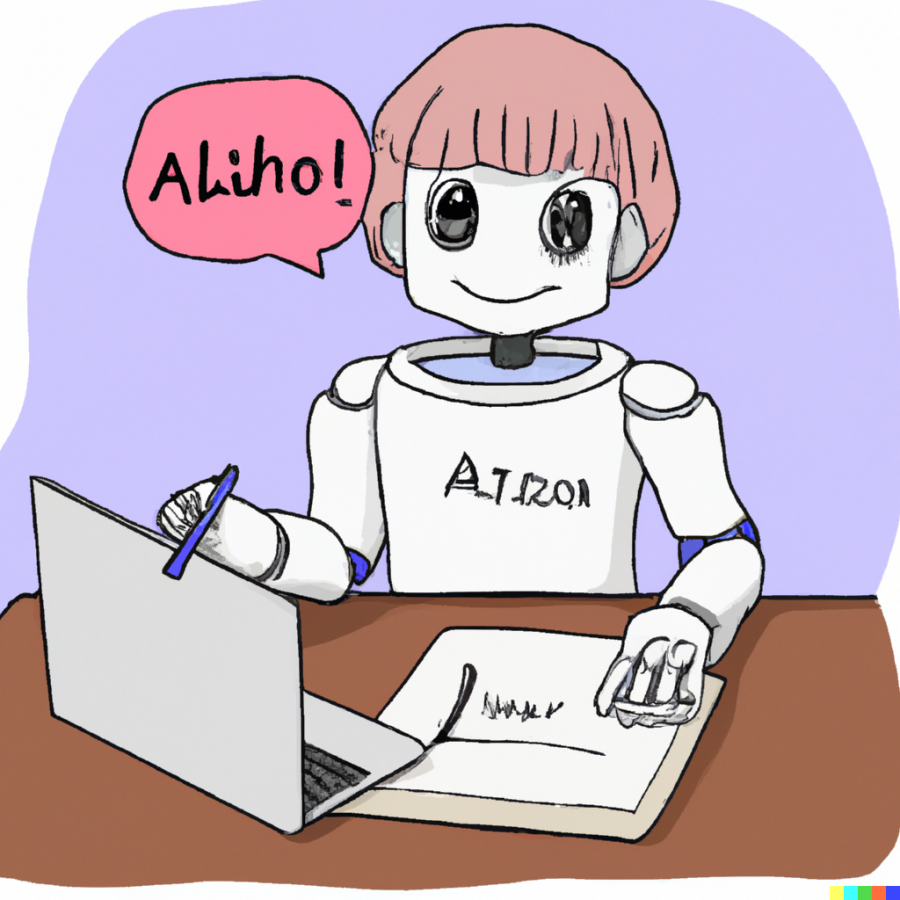
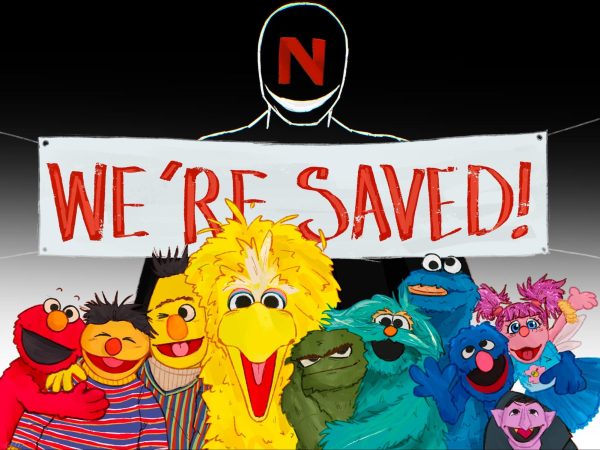
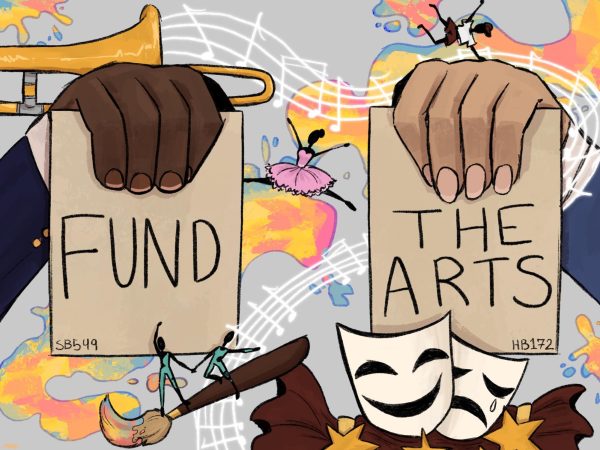
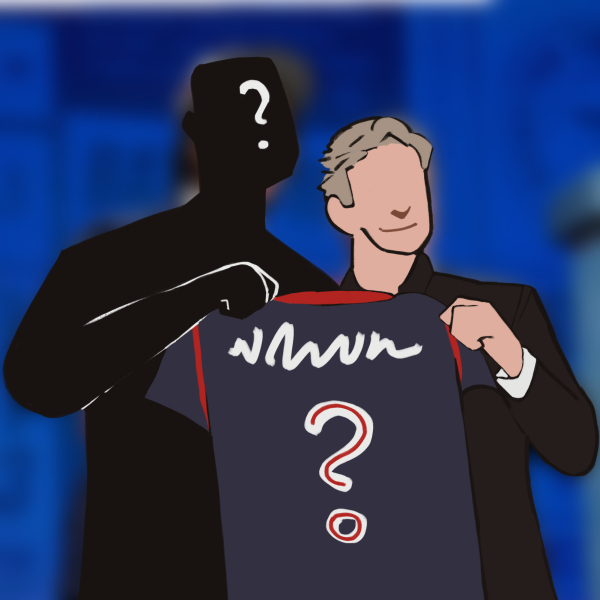
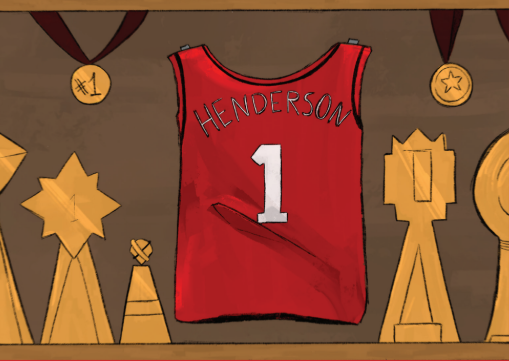
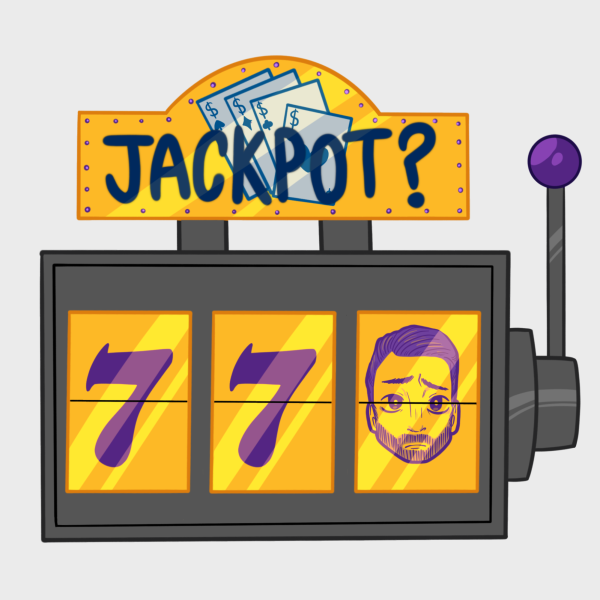
Ian • Feb 23, 2023 at 8:28 pm
Love the use of ChatGPT to write the lead and conclusion
Tejeshwar Jayaram • Feb 5, 2023 at 12:39 pm
Very informative ?